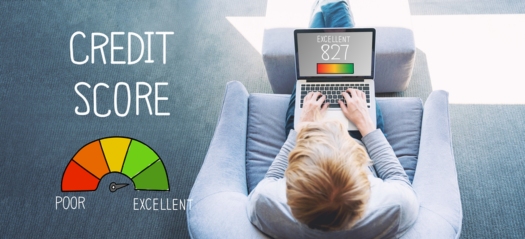Your credit score is typically what banks use to subjectively evaluate the credibility of your financing application. Your credit score reflects your creditworthiness to banks. A good credit score could mean enjoying better credit terms and better interest rates. On the other hand, a bad score could shut you out from banks either extending a loan or issuing a credit card to you. Essentially, it is an indicator of your financial health.
A credit report is a detailed record of your borrowings, repayment history and personal particulars. This report contains everything that a bank needs to know about your financial history and health before approving your loan application.
In Malaysia, there are 4 major credit agencies namely CTOS, Central Credit Reference Information System (CCRIS), RAM Credit Information Sdn Bhd (RAMCI) and the Credit Bureau Malaysia. Each agency has their own method of deriving your credit score.
What Factors Determine Your Credit Score?
In general, credit rating agencies tabulate their credit score based on the individual’s payment history, credit mix and loan amounts owed, length of credit history, new credit applications in the past 12 months and legal track record.
These information will allow financial institutions to determine a borrower’s 3C’s: Character, Capital and Capacity.
Your Character is reflected based on your attitude towards your loan. If you take pride in paying your bills promptly, you will get an A for reliability on your debt repayment. They also take into consideration your personal details such as the length of stay in your current address and the duration of your current employment.
Your Capital shows the number of valuable assets you hold which can be used as collateral such as property, investment or savings in the event you fail to repay your loan.
Your Capacity shows that the income you earn and it reflects your ability to pay off your debt. Thus, you need to make sure that you have sufficient cash flow running and this can be determined by your current income, the number of loan repayments, current living expenses, current debts in total and the number of dependents.
Most Common Reasons Malaysians Get Low Credit Score
1. Being a Bad Paymaster
Being chronically late on your bill payments can have detrimental effects on your credit score. Banks are extremely concerned about your repayment history especially if you have developed a habit of late payments. When another bank sees that you are never on time with your payments, they will have an automatic impression that you’re going to be late on their payments as well.
Late credit card and loan payments including PTPTN loans are reported by banks to the Credit Bureau of Bank Negara and stays in CCRIS for a period of twelve months.
In addition, the more incidents of credit transgressions, the more your score will suffer. And your recent negative financial record will affect your credit score more severely compared to a credit record that is several years old.
Any payment made 30 days after the due date will be reported to credit bureaus by your lender. It can take 7 years for a late payment, also called delinquency, to be removed from your credit record.
2. Defaulting on a Loan
Inability to settle car, house and personal loans or for being guarantors for other loan defaulters will have a significant adverse impact on your credit score.
If you have any accounts which repayments were not made over a prolonged period (normally over 6 months for a personal loan or credit card, potentially longer for a secured loan), your record may be red flagged as a “special attention account” in your CCRIS. Generally, banks will not proceed in your loan approval upon seeing any red flags in your CCRIS.
Banks will then transfer outstanding accounts to third-party collection agents in order to cut their losses or recover the arrears. As soon as a collection account is entered in your credit report, your credit score will be further deteriorated severely.
3. Sharing Poor Financial Relationships
Sharing financial relationships with others can have a toxic effect. For example, you might share utility payment with your housemate or roommate. Or you may have taken up a loan on behalf of your spouse, relative or friend, or even be a guarantor for a loan for them. If they default or delay on the payment, it will influence badly on your credit score. As a guarantor, the debt will become your responsibility if they don’t pay up, and that will add up to your debt burden, affecting your credit score.
4. Having No Credit History
Although you may manage your money well, a lack of credit history could actually be viewed as a negative attribute by the credit rating agencies. This is because banks will not have any track record of your past repayment behaviour.
The credit score looks to see if you have a lengthy history of managing your credit obligations. The older your credit report, the more points you will earn.
5. Having Rejected Credit Applications
When you apply for credit, you are giving the lender permission to pull your credit scores. Each time this happens, your credit report will reflect what’s called an “inquiry”. When a bank rejects an application, it’ll also appear on the report. Therefore, you should only apply for credit when you really need it and stop applying for new loans if you are continually rejected. Instead, work on fixing your score before reapplying.
6. Lack of Credit Diversity
You will earn good points if you have a nice diverse list of different types of accounts in your credit score. This includes mortgages, auto loans, personal loans and credit cards. If your credit score is dominated by one type of debt only, this could negatively affect the number of credit score points that you earn.
7. Maxing Out Your Credit Limit
The debt balances that you carry on your credit cards can affect your scores almost as much as whether or not you make your payments on time. This category calculates the proportion of balances to credit limits on your revolving credit card accounts – also known as revolving utilisation. The higher your revolving utilisation percentage, the fewer credit score points you will earn.
To determine your revolving utilisation, you’ll need to add up all of your current balances and all of your current credit limits on your open revolving credit accounts. This will give you a total balance and a total credit limit. Divide the total balances by the total credit limit and then multiply that number by 100. This will give you your total revolving utilization percentage. For example, let’s compare person A’s and person B’s credit record:
Person A with a higher revolving utilisation percentage will have a lower credit score.
A general rule is to try to keep credit card utilization percentage below 70% of your combined credit limit. Anything beyond that tends to upset your credit score.
This also means cancelling an old credit card you no longer use might be a bad idea, as it will reduce your credit limit and therefore logically increases your utilization. Try to reduce your debt instead.
8. Having Your Home Foreclosed or Car Repossessed
If you’re unable to make your mortgage payments, you’ll lose your home. Foreclosure will also affect your credit score, which can hurt your chances of qualifying for a new loan in the future.
The same goes if your car has been repossessed because you were delinquent on your auto loan. The repossession status will remain on your credit report for seven years from the date of the original delinquency.
9. Replacing Your Identity Card Too Many Times
Every time you replace your Malaysian Identity Card (NRIC), a number on the back of your NRIC indicates how many replacement you have had.
Having too many replacement NRICs can hurt your credit score, as lenders might view you as at risk for fraud and an easy target for identity fraud.
10. Owing Money to Telcos, Utilities, Banks & Even Parking Summons!
When an account goes into default, regardless of the amount owed, many telcos, banks, and utility companies will remark on a person’s record with credit reporting agencies. Some common reasons include:
▪ Unused bank accounts not having enough money to cover the service charges
▪ Owing telco’s small amounts of money after service has been terminated
▪ Unpaid parking summons
11. Undergoing Debt Restructuring/Rescheduling or Taking a Payment Holiday
Restructuring, rescheduling your loans or requesting a payment holiday from banks will cause banks to apply a special status tag to your CCRIS record. Such measures are only recommended as a last resort. Having a special status in your CCRIS record is very harmful for your credit score and significantly affects your chances of getting a loan in the future.
12. Dishonoured Cheque
Writing cheques that bounce will cause you to be placed on the DCHEQS system. DCHEQS is a system used to keep a history of dishonoured cheques issued by people. Being on this list will hurt your credit score.
If you have had two or more bounced cheques in the past 12 months, most banks will not proceed with your mortgage application. The record of bounced cheques will still remain even after the affected current account is closed.
Benefits of Having a Healthy Credit Score
1. Higher Credit Card and Loan Approval Chances
Having a healthy credit score shows that you are responsible and diligent about paying your bills, which significantly lower your risks as a borrower. The lower your risks are, the more likely it is for banks and lenders to approve your credit applications.
2. Faster Credit Approval
Your credit score can either speed up or slow down the approval process; the higher your credit scores are, the faster the banks and lenders will decide to lend you money.
If you have an average to low credit score, your credit application may have to go through more channels and departments to get it approved in which means you’ll have to wait longer than you would have if you had a healthier credit score.
3. Save Money on Interest Rates
Nowadays many banks are looking into devising tiered interest rates based on credit scores. So, it’s better to improve on your credit score so that you can enjoy the benefit of having a lower interest rate on credit cards and loans.
4. Better Negotiating Power
With a high credit score, you may negotiate the better terms when you’re applying for a new loan or credit card. The banks and lenders can see that you’re capable of paying them back in a timely and consistent manner from your credit history, so use it as a leverage to negotiate a lower interest rate or a better repayment plan.
5. Better Chance to Get Higher Credit Limits
Having a healthy credit score make it easier for a bank or a lender to trust you with a higher credit limit. This is because a healthy credit score can speak volumes about your ability to repay your bills on time.
6. Buy a Smartphone on Contract Without a Deposit
Plenty of telecommunications companies in Malaysia offer smartphone contract plans with zero deposit or interest rate. But, these plans aren’t available to everyone. These companies will usually look into your credit history before approving a smartphone contract application. So, if you have a bad credit score, you may be asked to put down a security deposit or worse, they might refuse your smartphone contract application and offer you a prepaid plan instead.
On the contrary, you get to save more by simply having a healthy credit score. Telecommunications companies tend to offer perks such as zero deposit or discounts when you sign up for a smartphone contract.
7. Get Approved for Instalment Plans at Appliances or Furniture Stores
Appliances and furniture stores around Malaysia often offer instalment payment plans when you purchase from them, especially when you’re making a big purchase.
However, major appliances and furniture stores will look at your credit score before approving your instalment payment plan application. After all, they need to know that you can pay them before they’ll let you take their merchandise home. A good credit score may even qualify you for low-interest or interest-free instalment plans, depending on the stores and their ongoing promotions.
Whereas having a bad credit means that you’ll have to pay in full when you make your purchases instead of being able to enjoy the benefit of instalment plans.
8. Access to Better Credit Card Deals
The best credit cards that come with attractive perks such as zero annual fees, low interest rates, higher credit limit and cashback require a high income and also need a high credit score to qualify for them.
9. Enjoy Better Employability
Certain jobs and large companies will perform a credit check on you before giving you an offer letter especially when you’re applying for jobs in the financial industry.
Currently, there are four credit agencies in Malaysia: one under Bank Negara and the other three are privately-owned entities. CTOS holds the most market share in the country, making it the leading player.
Here are the different credit agencies in Malaysia:
1. CTOS
CTOS is a private company which provides credit reporting for financial institutions to determine an applicant’s creditworthiness aside from using CCRIS. Usually, financial institutions use more than one credit report to determine an applicant’s credit health and CTOS is most widely used in Malaysia.
CTOS collects credit-related information from various public sources such as:
▪ National Registration Department
▪ Malaysia Insolvency Department
▪ Companies Commission Malaysia (CCM)
▪ Publications of legal proceedings and notices in newspapers and government gazettes.
The type of credit-related information included in the CTOS credit report includes bankruptcy, legal action and even case status. It also details an individual’s business exposure, business ownership and directorships if any.
Similar to CCRIS, CTOS does not provide comments or opinions and does not blacklist any individuals.
There are two types of reports provided by CTOS:
a. MyCTOS Basic report – A brief credit report that only includes legal cases, personal information, business information, bankruptcy declaration (if any) and banking payment history (derived from Bank Negara).
b. MyCTOS Score report – A comprehensive report that includes litigation and bankruptcy cases, directorship in registered companies, banking payment history from CCRIS and MyCTOS Score. You will have to pay RM25 so as to get the MyCTOS Score Report.
2. Central Credit Reference Information (CCRIS)
CCRIS is managed by the Credit Bureau of Bank Negara Malaysia and it collects credit information from financial service providers in Malaysia like banks, insurance brokers and even private companies providing utility services such as the telecommunication companies. Information that will be on the credit report from CCRIS are outstanding loans, summons, or whether the person has been declared bankrupt.
The data that is on the credit report will be broken down into a period of 12 months. It will contain credit-related information of an individual such as:
▪ Outstanding credit
▪ Special attention accounts, in which credit facilities are under close supervision of financial institutions
▪ Applications for credit in the previous 12 months that have been approved or are pending
CCRIS does not provide an opinion and does not blacklist individuals, it only provides factual data which will then be used by financial institutions.
You will find only one type of credit report from CCRIS and it does not involve a score. This is because the credit history and data collected is raw information that is not assessed and rated by Bank Negara.
You can get a copy of your CCRIS credit report personally from Bank Negara. You will need to bring along your MyKad to verify your identity.
3. RAM Credit Information Sdn Bhd (RAMCI)
RAMCI is backed by RAM Holdings Berhad, operates a credit-information bureau in Malaysia. RAMCI's credit reports are using its own credit score, i-Score.
i-Score is a three-digit number that predicts how likely you are to pay back a loan or other credit obligations on time. The higher the score, the lower the risk you are to the lenders or banks.
i-Score does not determine whether your application will be approved or the interest rate that banks will offer. However, it offers some guidance to the banks before approving a credit application.
There are three types of credit reports by RAMCI:
a. Personal Credit Report Basic (PCRB) – This basic report only provides RAMCI credit information (derived from RAMCI’s partners) and ANGKASA SPGA information (for public servants only).
b. Personal Credit Report Plus (PCRP) – This report provides RAMCI credit information, banking credit information, ANGKASA SPGA information and i-Score rated by RAMCI.
c. JagaMyID Subscription – With this subscription, you will receive a timely alert when someone applying credit card or loan facilities using your name or if they detect any changes in your credit profile. Apart from that, a monthly notification email will also be sent to you to update you on your credit profile changes and credit score.
4. Credit Bureau Malaysia
Credit Bureau Malaysia collects and compiles credit information from various sources. Then they process this data and disseminate it to financial institutions and other credit grantors. Credit Bureau Malaysia is jointly owned by Credit Guarantee Corporation Malaysia, Dun & Bradstreet Malaysia and the Association of Banks Malaysia.
You can get an Individual Credit Report (ICR) from Credit Bureau Malaysia to get an overview of your personal information, related business and companies information, MySCoRE assessment, dishonoured cheque summary, past inquiries, credit information and non-bank credit information.
How Is Your Credit Score Calculated?
Each credit agency has its own formula to evaluate every individual’s credit score.
1. CCRIS
CCRIS does not provide a credit score. It only provides information of an individual’s profile such as their name, address, business registration, credit application details such as the amount of loan applied for and credit account details such as the outstanding amount.
2. CTOS
A CTOS score is calculated based on credit information from both CCRIS and CTOS’s database. The score ranges between 300 and 850. A score of 718 – 850 is considered above average, 651 – 717 is fair and anything below 650 will make it either hard or almost impossible to obtain any credit from the banks.
There are 5 factors that make up a CTOS Score:
▪ Payment History (45%) – Whether you pay your loans on time or have missed payments in the past.
▪ Amount Owed (20%) – The number of credit facilities and the amount owed to the banks.
▪ Credit History Length (7%) – How long have you held a credit facility (credit card, or a loan)?
▪ Credit Mix (14%) – Types of loan and credit cards you hold – secured (home, car loans) vs unsecured credit (credit cards, personal loans).
▪ New Credit (14%) – Have you been approved for new credit facilities recently?
3. RAMCI
RAMCI’s i-Score is determined by debt repayment pattern, overdue accounts, frequencies of credit application and credit outstanding.
4. Credit Bureau Malaysia
Credit Bureau’s credit score (MYSCoRE) is assessed based on your debt repayment pattern, outstanding loan amount, credit application pattern and also tells probability of defaulting a debt.
Banks' Considerations for Loan Approval
A credit score is only one of the factors your bank considers and a high score is not a guarantee for approved applications.
Here is a list of information that banks will also consider before approving an application:
▪ Profession and Industry – Risky jobs may have lower chances of approval or higher interest charges.
▪ Income Level & Employment History – Your chances of approval for a credit card is higher if your income level is stable and you do not job-hop in a short period.
▪ Employer – Multinational corporations or government-employed applicants have a higher chance of getting approval.
▪ Bankruptcy or Legal Cases From the Past – Though your credit report may be ‘clean’ for the past three or five-year, banks still factor in your past history in bankruptcy declaration or legal cases before approving your application for a loan or credit card. A bankruptcy remark can stay on your report for 7 to 10 years, affecting your ability to seek new lines of credit.
▪ Asset – Banks may approve your application for credits if your net asset value is high.
▪ Down Payment and Loan Period for Loan Application – Banks will consider your credit application to be less risky if your down payment is higher (lower amount of loan) and length of loan repayment is shorter.
▪ Location of Residences – This unwritten rule applies to certain banks, subjective to their requirements and strategy. For instance, if they do not have a branch or resource in a certain state, they are less likely to approve an application from someone in that state.
Read more:
1. Boost App - The Malaysian Leading eWallet
2. What Is the Difference Between CCRIS and CTOS?
3. AirAsia BigPay - Sign Up Today To Get RM 10 Free Credit !
Edited by: 浪子
Bibliography
iMoney Editorial. (2018). 8 Most Common Reasons Malaysians Get Low Credit Score. Retrieved from https://www.imoney.my/articles/8-most-common-reasons-malaysians-get-low-credit-score
Loanstreet. (2018). 11 Things You Might Be Doing That May Hurt Your Credit Score. Retrieved from https://loanstreet.com.my/learning-centre/11-things-you-might-be-doing-that-may-hurt-your-credit-score
CompareHero My. (2018). The Ultimate Guide to Your Credit Score. Retrieved from https://www.comparehero.my/blog/guide-credit-score
Mark Reijman. (2017). How to Improve Your Credit Score. Retrieved from https://www.thestar.com.my/business/business-news/2017/09/16/how-to-improve-your-credit-score/
BBazaar. (n.d.). How to Improve Your Credit Rating in Malaysia. Retrieved from https://www.bbazaar.my/credit-card/how-to-improve-your-credit-rating-in-malaysia.html
RinggitPlus. (2017). 10 Benefits of Having a Healthy Credit Score. Retrieved from https://ringgitplus.com/en/blog/Personal-Finance-News/10-Benefits-of-Having-a-Healthy-Credit-Score.html
Mangalesri Chandrasekaran. (2016). 5 Tactics to Enhance Your Credit Score. Retrieved from https://www.propertyguru.com.my/resources/mortgage-guide/5-tactics-to-enhance-your-credit-score-4497
Shivali Joshi. (2019). 10 Things That Can Bring Down Your Credit Score. Retrieved from https://blog.bbazaar.my/things-that-can-bring-down-your-credit-score/
Kim Wong. (n.d.). Bank Reject Your Mortgage Loan Application? These 10 Reasons Explain Why! Retrieved from https://wmaproperty.com/blog/bank-reject-your-mortgage-loan-application-these-10-reasons-explain-why/
Factors Affecting Low Credit Score in Malaysia
 Reviewed by 浪子
on
February 07, 2019
Rating:
Reviewed by 浪子
on
February 07, 2019
Rating:
 Reviewed by 浪子
on
February 07, 2019
Rating:
Reviewed by 浪子
on
February 07, 2019
Rating:



























